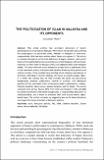Files in this item
The politicisation of Islam in Malaysia and its opponents
Item metadata
| dc.contributor.author | Wain, Alexander | |
| dc.date.accessioned | 2021-08-23T12:30:16Z | |
| dc.date.available | 2021-08-23T12:30:16Z | |
| dc.date.issued | 2021-06-30 | |
| dc.identifier | 275394843 | |
| dc.identifier | a057fc91-1c89-4ebe-a63e-fdbbaf711f50 | |
| dc.identifier.citation | Wain , A 2021 , ' The politicisation of Islam in Malaysia and its opponents ' , Islam and Civilisational Renewal , vol. 12 , no. 1 , pp. 27-52 . https://doi.org/10.52282/icr.v12i1.829 | en |
| dc.identifier.issn | 2041-8728 | |
| dc.identifier.uri | https://hdl.handle.net/10023/23815 | |
| dc.description.abstract | This article profiles four prominent detractors of Islam’s politicisation in contemporary Malaysia. While much ink has been spilt profiling the promulgators of politicised Islam, whether in Malaysia or elsewhere, comparatively little has been written about those who oppose it. This article is a modest attempt to rectify that deficiency. It begins, however, with a brief history of that politicisation process as it has occurred in Malaysia, with particular reference to Parti Islam Se-Malaysia (PAS) and Angkatan Belia Islam Malaysia (ABIM). This brief overview traces Malaysia’s unique form of politicised Islam to late twentieth-century intercommunal tensions driven by Malay poverty and cultural anxiety. These enabled long-standing ethno-religious associations to facilitate a blending of Islamist ideology with issues surrounding Malay rights. It is within this context that we then examine the social and educational backgrounds, principal publications, records of activism, and ideological positions of four prominent critics of Malaysian Islam’s politicisation, namely: Chandra Muzaffar, Zainah Anwar, Marina Mahathir, and Siti Kasim. The article concludes that all four figures differ from their counterparts in PAS and ABIM by possessing Western-orientated backgrounds, a long-standing dedication to multiculturalism, and a desire to orientate their work around human rights-based issues. The article concludes by suggesting how (or if) these detractors can impact the future direction of Malaysian politics. | |
| dc.format.extent | 25 | |
| dc.format.extent | 445487 | |
| dc.language.iso | eng | |
| dc.relation.ispartof | Islam and Civilisational Renewal | en |
| dc.subject | Political Islam | en |
| dc.subject | Malaysia | en |
| dc.subject | PAS | en |
| dc.subject | ABIM | en |
| dc.subject | Islamisation | en |
| dc.subject | Anwar Ibrahim | en |
| dc.subject | Sisters in Islam | en |
| dc.subject | Chandra Muzaffar | en |
| dc.subject | Marina Mahathir | en |
| dc.subject | Siti Kasim | en |
| dc.subject | JQ Political institutions Asia | en |
| dc.subject | T-NDAS | en |
| dc.subject | DOAE | en |
| dc.subject.lcc | JQ | en |
| dc.title | The politicisation of Islam in Malaysia and its opponents | en |
| dc.type | Journal article | en |
| dc.contributor.institution | University of St Andrews. School of Divinity | en |
| dc.identifier.doi | 10.52282/icr.v12i1.829 | |
| dc.description.status | Peer reviewed | en |
This item appears in the following Collection(s)
Items in the St Andrews Research Repository are protected by copyright, with all rights reserved, unless otherwise indicated.

